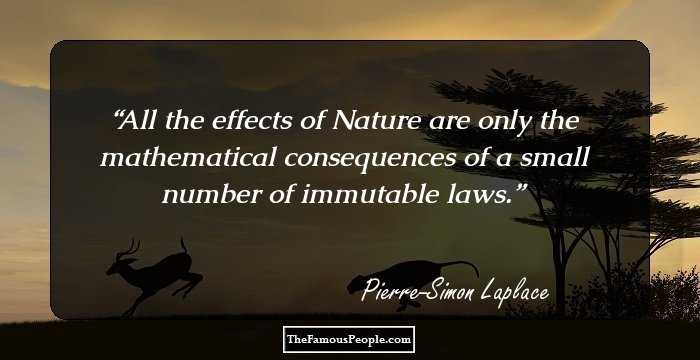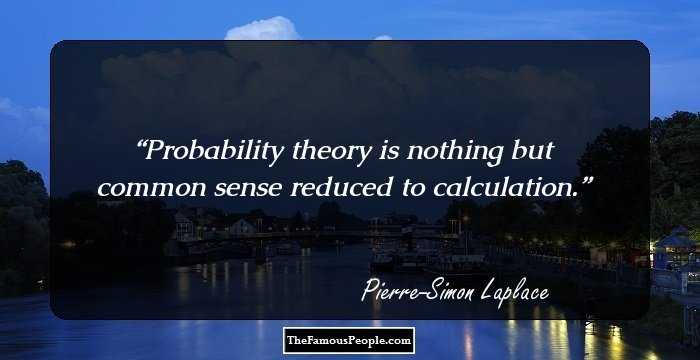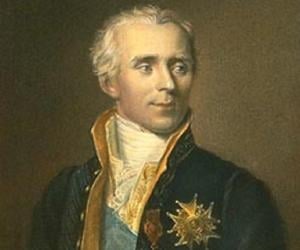
Read Euler, read Euler, he is the master of us all.

What we know is not much. What we don't know is enormous.

All the effects of Nature are only the mathematical consequences of a small number of immutable laws.

His last words, according to De Morgan: Man follows only phantoms.

What we know here is very little, but what we are ignorant of is immense.

Je n'avais pas besoin de cette hypothèse-là.
Given for one instant an intelligence which could comprehend all the forces by which nature is animated and the respective positions of the beings which compose it, if moreover this intelligence were vast enough to submit these data to analysis, it would embrace in the same formula both the movements of the largest bodies in the universe and those of the lightest atom; to it nothing would be uncertain, and the future as the past would be present to its eye.

The weight of evidence for an extraordinary claim must be proportioned to its strangeness.

The most important questions of life are indeed, for the most part, really only problems of probability.

Ce que nous connaissons est peu de chose; ce que nous ignorons est immense. What we know is not much. What we do not know is immense.

Probability theory is nothing but common sense reduced to calculation.

To Napoleon on why his works on celestial mechanics make no mention of God: Your Highness, I have no need of this hypothesis.

...by shortening the labours doubled the life of the astronomer. {On the benefit of John Napier's logarithms.}
The theory of probabilities is at bottom nothing but common sense reduced to calculus; it enables us to appreciate with exactness that which accurate minds feel with a sort of instinct for which of times they are unable to account.
It is India that gave us the ingenious method of expressing all numbers by means of ten symbols, each symbol receiving a value of position as well as an absolute value; a profound and important idea which appears so simple to us now that we ignore its true merit. But its very simplicity and the great ease which it has lent to computations put our arithmetic in the first rank of useful inventions; and we shall appreciate the grandeur of the achievement the more when we remember that it escaped the genius of Archimedes and Apollonius, two of the greatest men produced by antiquity.
Napoleon: You have written this huge book on the system of the world without once mentioning the author of the universe. Laplace: Sire, I had no need of that hypothesis. Later when told by Napoleon about the incident, Lagrange commented: Ah, but that is a fine hypothesis. It explains so many things.
If an event can be produced by a number n of different causes, the probabilities of the existence of these causes, given the event (prises de l'événement), are to each other as the probabilities of the event, given the causes: and the probability of each cause is equal to the probability of the event, given that cause, divided by the sum of all the probabilities of the event, given each of the causes.

Your Highness, I have no need of this hypothesis.

The telescope sweeps the sky without finding God.

I have lived long enough to know what I did not at one time believe--that no society can be upheld in happiness and honor without the sentiment of religion.

Do you believe in god? I have no need for that hypothesis, he may be around though.

Nature laughs at the difficulties of integration.

Truth and justice are the immutable laws of social order.
The simplicity of nature is not to be measured by that of our conceptions. Infinitely varied in its effects, nature is simple only in its causes, and its economy consists in producing a great number of phenomena, often very complicated, by means of a small number of general laws.
We are so far from knowing all the forces of nature and their various modes of action that it would be unworthy of the philosopher to deny phenomena simply because they are inexplicable at the present state of our knowledge. The more difficult it is to acknowledge their existence, the greater the care with which we must study these phenomena.
Without any doubt, the regularity which astronomy shows us in the movements of the comets takes place in all phenomena. The trajectory of a simple molecule of air or vapour is regulated in a manner as certain as that of the planetary orbits; the only difference between them is that which is contributed by our ignorance. Probability is relative in part to this ignorance, and in part to our knowledge.










